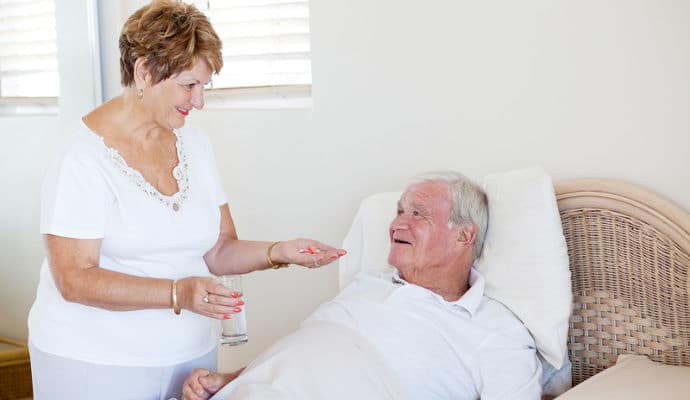
How to know if recovery is going well or not
After a hospitalization, the last thing anyone wants is for your older adult to have to return to the hospital.
But recovery doesn’t always go smoothly and seniors could suddenly take a turn for the worse. If that happens, it’s important to go back to the hospital for immediate medical attention.
There are many factors that can prevent a successful recovery, like if the doctor’s instructions weren’t clear, medication arrangements weren’t made, home health care wasn’t set up, there was no follow-up appointment, etc.
However, it can be difficult to know if recovery is on the right track or if there are red flags pointing to danger.
To help with that, we found a helpful article from U.S. News & World Report. It shares 4 signs that someone needs to return to the hospital after they’ve been discharged from a stay.
Here, we summarize the 4 ways to know if your older adult needs to go back to the hospital for further treatment.
4 ways to know if someone needs to return to the hospital
1. If you have any concerns, call the doctor and ask their advice
Unless it's an emergency situation that requires an ambulance or immediate trip to the emergency room, the best thing to do when you have a concern is to call and speak with the lead doctor who was treating your older adult at the hospital.
Their primary care doctor probably won’t have had a chance to catch up on what happened during the hospitalization.
That’s why it’s important to speak with the doctor who knows most about their recent treatment and current condition.
To keep your older adult’s recovery on the right track, before leaving the hospital, insist on getting the following information:
- Lead doctor’s direct phone number
- Details for the confirmed follow-up appointment
- Copies of all test results and lab tests
- The signals or symptoms that will let you know that a call to the doctor is needed
- What a normal or successful recovery should look like for your older adult
2. They have alarming symptoms
Recovery will take time, especially for older bodies, so continuing to have some symptoms after going home is to be expected.
But some symptoms are warning signs that there’s a problem with recovery.
For example, after surgery, a fever, severe pain, or new or smelly discharge at the incision are signs that your older adult needs immediate medical attention.
Or, if they had a procedure to open a blocked artery and then develop severe chest pain or shortness of breath, they need to go back to the hospital.
And when someone is recovering from pneumonia and they can’t catch their breath to the point of feeling like they’ll pass out, it’s time to go back to the hospital.
3. They feel worse than when they entered the hospital
Nobody feels great after getting discharged from the hospital.
After all, leaving the hospital only means that your older adult is well enough to no longer need hospital-level care. There’s still a long road to recovery.
However, there’s a difference between normal recovery and the real danger in taking a turn for the worse.
If your older adult feels worse than when they first went to the hospital or their symptoms show no improvement (or get worse), they should go back to the hospital.
In general, their discomfort and/or symptoms should be slowly decreasing each day as they heal.
4. They feel that something is really wrong (“impending doom”)
Each person knows their body best and knows if something is wrong.
If your older adult’s judgement is typically sound, they may have a gut instinct if something feels really wrong (“impending doom”).
If that happens, call the doctor right away to express their concerns. If what the doctor says doesn’t ease their fears, go back to the hospital to be on the safe side.
Next Step Find out about 4 signs that someone needs to return to the hospital at U.S. News & World Report
Recommended for you:
- This Hospital Discharge Checklist Prepares Seniors for Successful Recovery
- 18 Hospital Tips from Insiders Improve Seniors’ Care and Recovery
- Dementia and Hospital Stays: 9 Ways to Reduce Agitation and Stress
By DailyCaring Editorial Team
Image: Comfort Keepers
This article wasn’t sponsored and doesn’t contain affiliate links. For more information, see How We Make Money.
[optin-monster slug=”yxbytm35zhsdfopnw7qk”][optin-monster slug=”jvhyplxmb4umsjazxecn”]
About the Author

Connie Chow
Connie was a hands-on caregiver for her grandmother for 20 years. (Grandma made it to 101 years old!) She knows how challenging, overwhelming, and all-consuming caring for an older adult can be. She also knows how important support is — especially in the form of practical solutions, valuable resources, and self-care tips.




